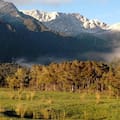A team of researchers will delve deeper into the history of Te Arawa lakes in the Rotorua area, with hopes to collect vital clues to the health of the lakes over the past 1000 years.
By Isobel Prasad
Scientists from GNS Science, the Cawthron Institute, Victoria University of Wellington and the University of Otago will sample lakes Rotorua, Okataina and Okareka as part of the nationwide project "Lakes 380-Our lakes".
The project aims to determine the health, wellness and history of around 10 per cent of New Zealand's 3,800 lakes.
Te Arawa Lakes Trust Environment Manager, Nicki Douglas, called the research an "exciting opportunity" to see how factors such as human arrival and the Mt Tarawera eruption in 1886 impacted the lake ecosystems.
"Our knowledge from ancestors only goes so far, so having the research from deep within the earth is not only a welcomed insight into the history of our lakes, it also enables us to see how the lake health and ecosystems have changed over time, which will help us future-proof our work in protecting the taonga for generations to come," she said.
So far, the findings have shown the bacterial communities within Lake Okataina have not returned to their pre-eruption state, despite the eruption occurring 130 years ago.
Findings also show that in most, but not all lakes, the algae has increased in the last 200 years, which is believed to be associated with land use change and the introduction of other animals and plants.
Although the findings are alarming, Douglas says results such as this were expected.
"Having the 1000-year data to show how our lake health has deteriorated enforces the biosecurity mahi that we do to protect the lakes."


















SHARE ME